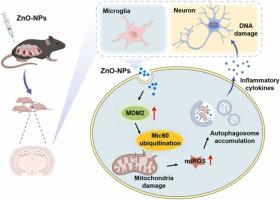Journal of Hazardous Materials ( IF 13.6 ) Pub Date : 2023-06-01 , DOI: 10.1016/j.jhazmat.2023.131750 Yanli Zhang 1 , Yulin Zhang 2 , Ye Lei 3 , Junrong Wu 2 , Yiyuan Kang 2 , Shuo Zheng 2 , Longquan Shao 1

|
During pregnancy, the human body is quite vulnerable to external stimuli. Zinc oxide nanoparticles (ZnO-NPs) are widely used in daily life, and they enter the human body via environmental or biomedical exposure, thus having potential risks. Although accumulating studies have demonstrated the toxic effects of ZnO-NPs, few studies have addressed the effect of prenatal ZnO-NP exposure on fetal brain tissue development. Here, we systematically studied ZnO-NP-induced fetal brain damage and the underlying mechanism. Using in vivo and in vitro assays, we found that ZnO-NPs could cross the underdeveloped blood brain barrier and enter fetal brain tissue, where they could be endocytosed by microglia. ZnO-NP exposure impaired mitochondrial function and induced autophagosome overaccumulation by downregulation of Mic60, thus inducing microglial inflammation. Mechanistically, ZnO-NPs increased Mic60 ubiquitination by activating MDM2, resulting in imbalanced mitochondrial homeostasis. Inhibition of Mic60 ubiquitination by MDM2 silencing significantly attenuated the mitochondrial damage induced by ZnO-NPs, thereby preventing autophagosome overaccumulation and reducing ZnO-NP-mediated inflammation and neuronal DNA damage. Our results demonstrate that ZnO-NPs are likely to disrupt mitochondrial homeostasis, inducing abnormal autophagic flux and microglial inflammation and secondary neuronal damage in the fetus. We hope the information provided in our study will improve the understanding of the effects of prenatal ZnO-NP exposure on fetal brain tissue development and draw more attention to the daily use of and therapeutic exposure to ZnO-NPs among pregnant women.
brain barrier and enter fetal brain tissue, where they could be endocytosed by microglia. ZnO-NP exposure impaired mitochondrial function and induced autophagosome overaccumulation by downregulation of Mic60, thus inducing microglial inflammation. Mechanistically, ZnO-NPs increased Mic60 ubiquitination by activating MDM2, resulting in imbalanced mitochondrial homeostasis. Inhibition of Mic60 ubiquitination by MDM2 silencing significantly attenuated the mitochondrial damage induced by ZnO-NPs, thereby preventing autophagosome overaccumulation and reducing ZnO-NP-mediated inflammation and neuronal DNA damage. Our results demonstrate that ZnO-NPs are likely to disrupt mitochondrial homeostasis, inducing abnormal autophagic flux and microglial inflammation and secondary neuronal damage in the fetus. We hope the information provided in our study will improve the understanding of the effects of prenatal ZnO-NP exposure on fetal brain tissue development and draw more attention to the daily use of and therapeutic exposure to ZnO-NPs among pregnant women.
中文翻译:

MDM2 上调通过胎儿小胶质细胞炎症中 Mic60 泛素化诱导线粒体自噬缺陷,从而导致怀孕期间暴露于 ZnO-NPs 引起的神经元 DNA 损伤
怀孕期间,人体很容易受到外界刺激。纳米氧化锌(ZnO-NPs)在日常生活中广泛使用,它们通过环境或生物医学暴露进入人体,存在潜在风险。尽管越来越多的研究已经证明了 ZnO-NP 的毒性作用,但很少有研究探讨产前 ZnO-NP 暴露对胎儿脑组织发育的影响。在这里,我们系统地研究了ZnO-NP引起的胎儿脑损伤及其潜在机制。通过体内和体外测定,我们发现 ZnO-NPs 可以穿过未发育的血液 穿过脑屏障并进入胎儿脑组织,在那里它们可以被小胶质细胞内吞。ZnO-NP 暴露会损害线粒体功能,并通过下调 Mic60 诱导自噬体过度积累,从而诱发小胶质细胞炎症。从机制上讲,ZnO-NPs 通过激活 MDM2 增加 Mic60 泛素化,导致线粒体稳态失衡。通过 MDM2 沉默抑制 Mic60 泛素化可显着减弱 ZnO-NP 诱导的线粒体损伤,从而防止自噬体过度积累并减少 ZnO-NP 介导的炎症和神经元 DNA 损伤。我们的结果表明,ZnO-NPs 可能会破坏线粒体稳态,诱导胎儿异常自噬流、小胶质细胞炎症和继发性神经元损伤。
穿过脑屏障并进入胎儿脑组织,在那里它们可以被小胶质细胞内吞。ZnO-NP 暴露会损害线粒体功能,并通过下调 Mic60 诱导自噬体过度积累,从而诱发小胶质细胞炎症。从机制上讲,ZnO-NPs 通过激活 MDM2 增加 Mic60 泛素化,导致线粒体稳态失衡。通过 MDM2 沉默抑制 Mic60 泛素化可显着减弱 ZnO-NP 诱导的线粒体损伤,从而防止自噬体过度积累并减少 ZnO-NP 介导的炎症和神经元 DNA 损伤。我们的结果表明,ZnO-NPs 可能会破坏线粒体稳态,诱导胎儿异常自噬流、小胶质细胞炎症和继发性神经元损伤。



























 京公网安备 11010802027423号
京公网安备 11010802027423号